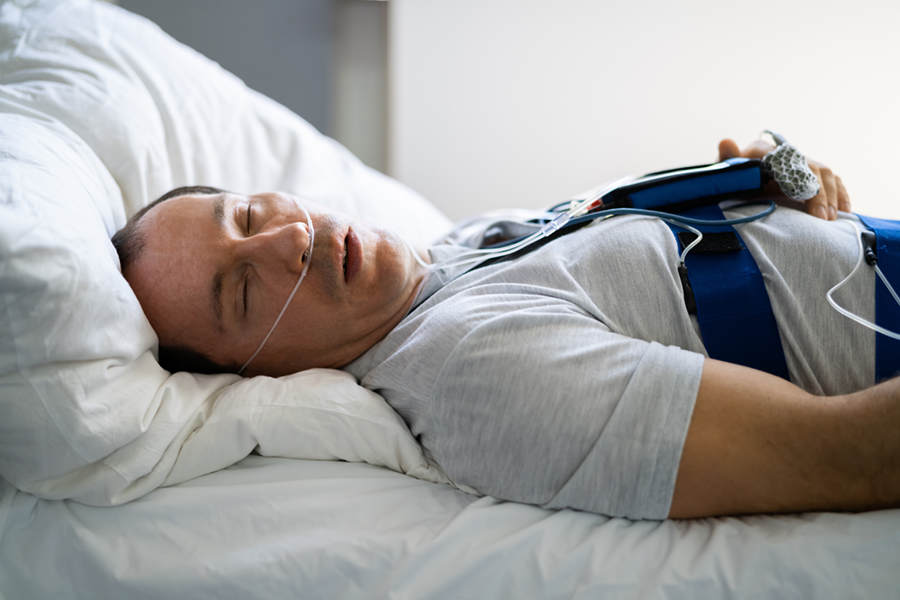Having trouble sleeping? Constantly battling fatigue?

If you need more than 30 minutes to fall asleep on a regular basis, you wake up often during the night, or you chronically feel exhausted during the day even after averaging 8 hours of sleep, then you may have a sleep disorder.
Unfortunately, sleep disorders can go undiagnosed because many people don’t realize they have one. You might attribute your daytime fatigue to stress or aging. You might just ignore the fact that you sleep poorly. But, it’s very important to have a potential sleep disorder diagnosed and treated.
Sleep is essential for good health. Inadequate sleep quality can affect all areas of your life from your mental and physical health, to your motivation and productivity, to your personal relationships.
How are sleep disorders diagnosed?
There are several steps necessary to evaluate your symptoms, correctly diagnose the sleep disorders you may have, and determine the correct treatment.
First, a thorough medical exam is necessary to identify underlying or contributing medical issues. As a part of that exam, a complete history of the type and duration of your symptoms is critical along with a list of all medications you take. Keeping a log of your sleeping habits and issues can greatly contribute to the accuracy of reporting your symptoms during this first step.
Second, if sleep apnea is suspected, a sleep test you can perform at home may be recommended to collect more precise details about the sleep problems you experience.
Third, based on the results of the first two steps, it may be necessary for you to undergo additional diagnostic tests such as blood-work, CT scan or in-lab sleep study.
When is a home sleep test recommended?
People who snore make a noisy, vibrating, rattling sound while they breathe during sleep. You may not even be aware that you snore but ask your bed partner. They can tell you!
A home sleep test is effective at helping your doctor pinpoint breathing issues related to sleep apnea, one of the most common sleep disorders. In the past, obstructive sleep apnea (OSA) could only be diagnosed one way – through a lab conducted sleep study called polysomnography. Home sleep apnea tests have given many people a convenient, more cost effective and more comfortable means of testing.
How does the in-home sleep apnea test work?
A home sleep apnea test is designed to be a convenient way to collect information about your sleep. You’ll use a small, lightweight portable monitor with attachments to collect measurements for 1
- oxygen saturation
- heart rate
- nasal and oral airflow
- movement in your chest and abdomen
- time spent snoring
- your sleeping position
Once your study is complete, the equipment will be returned to the diagnostic service company for the measurements to be processed and interpreted by a sleep physician. A report will be sent to your physician to discuss with you.
Why would I ever need a lab study?
It would be a choice for you and your doctor to make based on your specific situation. A home test only measures breathing, not actual sleep, so it is possible to have an inconclusive, underestimated, or false negative result. 1,2 A laboratory sleep study measures additional factors that allow for detecting a wide variety of sleep disorders. 1 Also, a monitored, more-detailed polysomnography is the only option for some individuals with certain pre-existing health considerations. 2
What are the benefits of a home test over a lab study?
- More convenient – you don’t have to travel to a sleep lab or spend the night away from home.
- More comfortable – you can sleep in the comfort of your own bed.
- More cost effective – insurance companies are approving this less costly first line of sleep testing. 2
- Effective – home tests can confirm whether or not you have sleep apnea. 1
Questions and Answers about Home Sleep Testing for Sleep Apnea 3
How long do you wear the test equipment?
Usually, you wear the equipment for 1-3 nights, depending on your doctor’s instructions.
Is the test uncomfortable or painful?
No, home sleep testing equipment usually attaches to the body by velcro, elastic, and sometimes stickers.
How do I get a home sleep test for sleep apnea?
Your doctor will either provide you with equipment and instructions, or he may give you a prescription to obtain the test in person or by mail. There are sleep centers, home sleep study companies, and home sleep test businesses that make the test available.
There’s no need to postpone a better quality of life.
Indianapolis Sinus Center can diagnose and treat your sleep disorder
References


